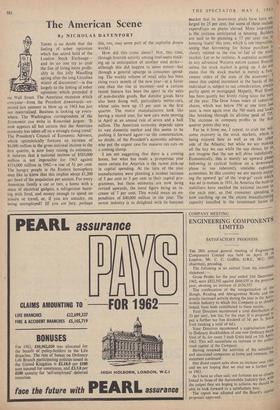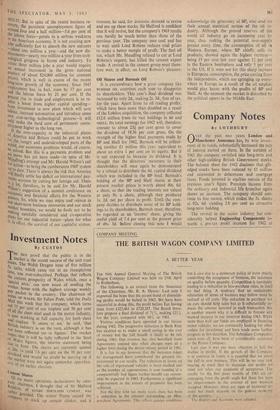The American Scene
By NICHOLAS DAVENPORT
THERE is no doubt that the feeling of sober optimism which has seized hold of the London Stock Exchange— and let no one try to crab the fun of living more profit- ably in this jolly Maudling spring after the long Lloydian winter of discontent!—is due largely to the feeling of sober ( optimism which preceded it on Wall Street. The American recession which everyone—from the President downwards—ex- pected last summer to blow up in 1963 has just not materialised. Business is looking up every- where. The Washington correspondent of the Economist can write in Rostovian jargon : 'It now appears all but certain that the American economy has taken off on a strongly rising trend.' The President's Council of Economic Advisers, which optimistically forecast an increase of $6,000 million in the gross national income in the first quarter, is now busy raising its estimates. It believes that a national income of $585,000 million is not impossible for 1963 against $554,000 million in 1962—a rise of 51 per cent. The hungry people in the Eastern hemisphere may like to know that this implies about £1,200 per head of the population per annum. For every American family a car or two, a home with a mass of electrical gadgets, a refrigerator burst- ing with food, and money enough to spend on leisure or travel, or, if you are unlucky, on being unemployed! (If you are lazy, perhaps
this, too, may seem part of the capitalist dream world.)
How did this come about? Not, this time, through feverish activity among steel-users stock- ing up in anticipation of another steel strike— although this did happen to some extent—but through a general upsurge in consumer spend- ing. The weekly volume of retail sales has been rising every month of the new year—at a faster rate than the rise in incomes—and a curious recent feature has been the spurt in the sales of non-durable goods. But durable goods have also been doing well, particularly motor-cars, whose sales were up 13 per cent in the first quarter. The motor manufacturers look like having a record year, for new cars were moving in April at an annual rate of seven and a half million. The American economy depends upon its vast domestic market and this seems to be pushing it forward again—to the consternation, no doubt, of the President's economic advisers, who put the urgent case for massive tax cuts on a coming slump.
I am not suggesting that there is a coming boom, but what has made a prosperous year more certain for America is the recent pick-up in capital spending. At the turn of the year manufacturers were planning a modest increase of 3 per cent to 5 per cent in their capital pro- grammes, but these estimates are now being revised upwards, the latest figure being an in- crease of 7 per cent. This would mean an ex- penditure of $40,000 million in the year. The motor industry is so delighted with its buoyant market that its investment plans have been en- larged by 25 per cent, but some of these include expenditure on plants abroad. More important is the increase anticipated in housing. Builders are said to be planning a 17 per cent rise In housing 'starts' this year, which is not impossible, seeing that borrowing for house purchase IS closely related to the rise or fall of the stock market. Let us be realistic. A capitalist economy in any advanced Western nation cannot flourish unless the stock market is going up. I do not mean that the stock market is merely a for runner index of the state of the economy: mean that capital increment in the hands of the individual is, subject to tax consideration, alwaYs partly spent or mortgaged. Happily, Wall Street has been quietly but firmly rising since the turn of the year. The Dow Jones index of industrial shares, which was below 550 at one time last year, is once again over the 700 mark and looks like breaking through its all-time peak of 735. The increase in company profits in the first quarter points that way. Far be it from me, I repeat, to crab the we!" come recovery in the stock markets, which is being enjoyed here as well as on the other side of the Atlantic, but while we are making all the hay we can while the sun shines, let us not imagine that the sun will shine indefinitely. Economically, this is merely an upward phase following in cyclical fashion on a downward phase in too inherently unstable capitalist economies. In this country we are merely enloY: ing the upward 'go' of the `stop-go' cycle which was set in motion in 1951. In America the built-In stabilisers have enabled the national income tp rise each year, so that consumer spending Is now catching up on the excess manufacturing capacity installed in the investment- boom of 1955-57. But in spite of the recent business re- covery, the persistent unemployment figure of around four and a half million-5.6 per cent of the labour force—points to a serious weakness to the American economy. It is not creating new jobs sufficiently fast to absorb the new entrants --about one million a year—and the new dis- placements—nearly two million a year from tech- nological progress in farms and industry. To create three million jobs a year would require an annual increment in the gross national Product of about $24,000 million (at constant Prices), which is well in excess of the recent longterm growth of the economy. Since 1947 employment has, in fact, risen by 17 per cent and the labour force by 21 per cent. If the present rise in trade and employment is to re- ceive a boost from higher capital spending— 'torn investment in new plant which will save labour, increase automation and introduce some new cost-saving. technological process—it will Only make the hard core of permanent unem- ployment higher in the long run. if the over-capacity in the industrial plants nt. America and Britain could be put to work fir). the hungry and underdeveloped parts of the
world, our economic problems would, of course, be solved,. But this is a payments problem and n,9 move has yet been made—in spite of Mr. andling's attempt and Mr. Harold Wilson's call tor action—to bring the cumbersome IMF system uP to date. There is always the risk that America will finally settle her deficit on international pay- inents account by cutting her foreign aid. There is a lot, therefore, to be said for Mr. Harold
ti6nn's suggestion of a summit conference on economic and financial affairs for the Western Pcnvers. So, while we may enjoy and rejoice in °lir short-term business recoveries and our stock Market boomlets, we would be fools not to be making carefully considered and co-operative Flans for our industrial future—plans for what s, to effect, the survival of our capitalist system.







































 Previous page
Previous page